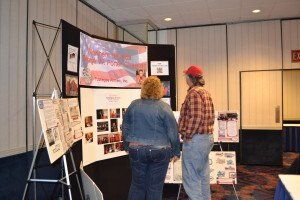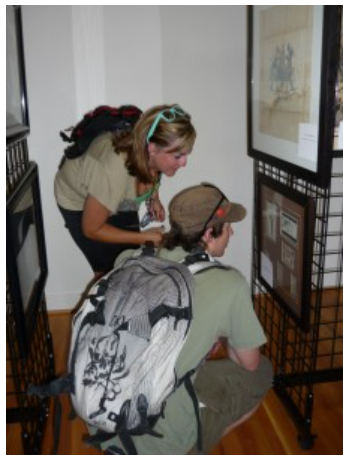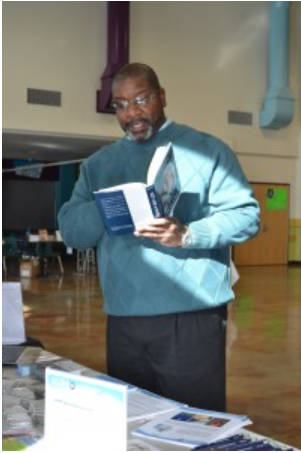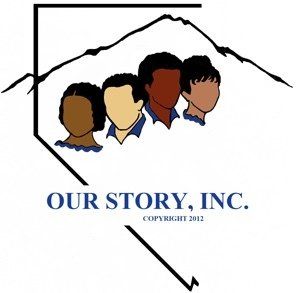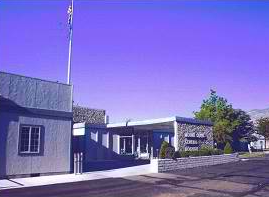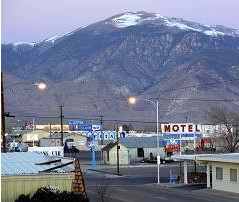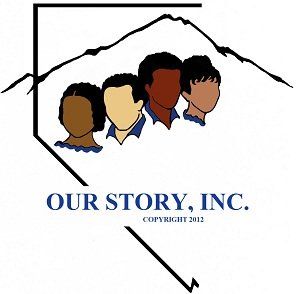OSI – What was it like growing up there?
Carmen – It was comfortable . It was nice. We didnt have a lot but we made due with what we did had. My parents were real strict. They did not allow me to do a lot of things out side the house. Anything I did do outside of the house my mother took me to. She kept me active. I wasnt involved in a lot of school activities, but being a small community our parents tried to get us in a lot of things. Itook dancing lessons from the age of four up to about eight years old. They even tried to start a little debutant organization in Hawthorne. I didnt like that. I was a tomboy. I didnt want to have anything to do with dresses and frills. I was a daddys girl also. Id rather be with my father working on a car or up behind the TV trying to fix it. I didnt want anything to do with cleaning the kitchen, cleaning the house, cooking or non of that stuff. So I was a daddys girl and my mother tried hard to make me into a young lady. I was raised in Bethel Baptist Church in Hawthorne as a little girl.
OSI – Who was the pastor?
Carmen – I cant remember my first pastor at that time. But Reverend Harris was one of our pastors. As a matter of fact he conducted my marriage ceremony. Vera Davis and her son Columbus Davis lived in Hawthorne. And Connie Davis and I were really good friends. In church Ms. Davis was one of our Sunday School teachers. I remember that. We had a pretty good congregation there. We were all raised in that church. We had the BYU. We had all those different little programs. We had a childrens choir and things like that. They were tough on us. They use to pinch us when we acted up.
OSI – Even though the black community was small would you say it was a strong community?
Carmen – I Think so. You know when you say it takes a community to raise children? In Hawthorne thats the way it was. When we lived in Babbitt one of my dearest friends mother lived next door and that was Wileva Speights. She was like a second mother to me. I remember one day I was outside striking matches and I told Charlotte dont you tell your mom but her mom had already seen me. She called Charlotte in and then called me in, and then she proceeded to whip my behind for sticking those matches. I was also raised with Regina Brantly and her family. Whenever I would go down and visit her, if we did anything wrong, Ms. Brantly would whip my behind just like my parents would and then I would go and get another whippin from my parents. So it was a community. In Babbitt we had a small little commercial area where they had a Safeway grocery store and a Johnson Rexall Drugs Store. And I can remember as a child going into Johnson drug store with two of my girl friends, because we were going to have a party. Well we didnt have any money to get anything so we stole some candy and Mr. Johnson saw me steal it. And so he held me there and called my parents. Thats how close the community was. He was a white man but he didnt treat us like we were black kids who were doing wrong. He treated us like he would any other kid. He just pulled me to the side. Called my parents. My dad came and got me. Mr. Johnson told him what I did, and of coarse I suffered the repercussions. Mr. Johnson talked to me about stealing and being trusted, and when you do something like this to people you loose that trust. And so I learned a lesson from that. But that was a community raising a child. We may have lived in a segregated area but we all, the black and white kids, went to the same school. There was no segregation in the schools.
OSI – What were the names of the schools you attended there?
Carmen – I went to Babbitt Elementary from 1st grade till about 3rd grade. And then I went to Hawthorne Elementary in 4th. I attended Hawthorne Junior High School and then, Mineral County High School. We were bused to school from Babbitt to Hawthorne.
OSI – Was it obvious that there were racial problems?
Carmen – They had a casino which is still there, the El Capitan and it was owned by this white man named Woody Loftin. But believe it or not blacks could not go into the casino. I dont even think they worked in the casino. They didnt hire black people. But he ran a gambling organization outside of the casino with blacks. Matter fact he would loan them money. I dont know the details but I am sure it was a situation where he did not have to report what he was doing. He would loan people money to gamble. I remember my dad talking about that when I was little and my dad unfortunately had a bad gambling habit. And somewhere in the town the blacks would go and do their gambling, but they could not go to the casino to do it. They would also borrow money from him to buy cars and stuff like that. That was a part of his entrepreneurship even though that part of it was wrong. Just like even at the base in Hawthorne racism and segregation was wrong but it existed. It was a military base but what they were doing was making ammunition for the war. The base got its start during World War II if Im not mistaken. It was established for that purpose. So they were making ammunition that was going to be sent to the war and they were also bringing back ammunition that wasnt any good and would have to be broke down. There was a rumor that the reason they were hiring black people was because it would put them in harms way other than putting the white people in harms way. Thats why they could get jobs out there. But if you are a young black person from Monroe Louisiana, like my parents were and you couldnt get a job other than going back out to the cotton fields you looked west for a job, for a chance to start over, for a chance to have something.
OSI – And even though that was dangerous it was attractive?
Carmen – Exactly. A lot of people came out west for that purpose.
OSI – What impact has the black citizens of Babbitt had on the Northern Nevada community today?
Carmen – They impact Northern Nevada as well as this country with their willingness to work hard and be productive inspite of the racism, segregation and danger they experienced because of the color of their skin. Hawthornes ability to survive as long as it did and this countries success during the wars of the Babbitt era, was largely in part due to the contributions and courage of the Blacks in Babbitt Nevada. I think the vast majority of them went to Vegas. There was a few that went to Reno. A lot of them bypassed Nevada and went to California. Maybe the opportunity was better in California. A few have made an impact. Take Luther Mack and his family, theyre from Hawthorne. I dont know his family origin but they started in Hawthorne and then came to Reno. So, you know, that was the black heritage, I dont care what brought them out here, at least they came out here and I tried to make it happen. I am proud to have come from Nevada. Im not ashamed that Im from Nevada. And I am very happy that I am from Hawthorne Nevada, because I think it produced a fairly decent quality person. People that wanted to work within the system, people that wanted to have something, all they needed was a chance to have it. Regardless of how it was going to be given, it was a chance. Thats all anybody wants is a chance to have a piece of the American pie. Just dont slam the door in their face to keep them from having it. And as I was growing up I remember my mother telling me she use to clean peoples houses and toilets for a living in her early years. She never wanted me to do that. It was impressed on me to get an education and just be smart about life. If you are going to go out there and work just try to work as hard as you can to have what you need to have. Thats how I was raised. My parents were hard workers. Both of them.
OSI – When did you move from Hawthorne to Reno?
Carmen – 1982. I probably would have never left Hawthorne had I not decided that I wanted to do something different. And also because I noticed that my children were starting to succumb to the things that corrupt teenagers. I thought if I stayed in Hawthorne I could keep them away from the drugs, the sex, whatever it was that would keep them from advancing in life. But when I discovered that that wasnt going to make a difference I decided that maybe we needed a better opportunity so I changed careers and I came to Reno to go to beauty school and thats how I ended up here.
OSI – Regarding Hawthorne, when did the majority of the blacks move to other areas?
Carmen – Oh Yeah. You know Hawthorne suffered economic struggles just like any place else. But mostly its economic struggle came at the end of war. When there was no more war then there was no longer work. And of coarse the young people wanted to leave home. They didnt want to live like their parents. .They thought that maybe a bigger city would offer them more opportunity. So when they got out of high school and went to college that was their out. If they didnt go to college then they ended up stuck at the base working and a lot of young people did not want to end up at that base. Truthfully the money was good. It was just a economically deprived town. You could make good money, but what did you have to spend it on in Hawthorne. Some of the towns down fall was when its citizens got paid, whether once or twice a month, those people would take their money and go to Fallon to buy groceries or come to Reno and buy groceries and spend their money. So they werent putting their money back into their community. It didnt have anything to offer.
OSI – What was the population back then.
Carmen – I dont know. It fluctuated over the years. During the Vietnam War we had our biggest influx of people. At that point in time they were working people, three shifts, seven days a week, at that base. So they were making money and there were lots of people working 24/7, coming and going. Some would stay and some would just take what they made and leave. The town itself had nothing to offer. We had one grocery store and that was Safeway and one small grocery store which was Josephs market. Their prices were high because we were out in the middle of nowhere. the cost to bring goods to Hawthorne is what made the cost high. The Safeway in Reno would be cheaper than the Safeway in Hawthorn. And people had to make that dollar last. The base didnt pay you every week. It paid you on a two week bases or once a month bases depending on what department you worked in or if you worked for the Federal government. I remember going to the grocery store was the community event. I hated it. I would go into the store with my mom and the minute wed hit the door my mom would start speaking to someone like they hadnt seen each other in that small town for a while. We would go over on the far left side where the meat was and she would go up that counter looking at every piece of meat. Then we would come back down on the grocery side checking out every item. I would tell my mother, Dont you know what you want?
OSI – It was a treat for her to come to Reno?
Carmen – Yeah. Well this was even in Hawthorne. It was a treat because she ended up being a stay-at-home mom and not really getting out that much. Every two-week payday everybody was at the grocery store and got a chance to socialize other than going to Church.. And my dad would sit in the car and wait and I would ask him, Can I stay with you?. He would say, No. Go in the store. I think thats why I hate grocery shopping to this day.
OSI – What is Hawthorne like today?
Carmen – A dieing town. They have had some companies and corporations looking to place something there to build the economy. But I have to say that Hawthorne is having a problem. The county commissioners and the people of Hawthorne actually didnt want outsiders. They did not want new companies coming in. They wanted what they had to flourish. So they made it difficult for companies and corporations and it hurt the town more than help. Those other corporations could have come in and Hawthorne could have got taxes off of that, and brought more people there, but the main source of income was that base. We had a few mines that were around that also employed people for a while but they would operate for so long and then they would shut down because the mines would run out. But the base was the main source of income and when there was no war then Hawthorne no-longer flourished.
